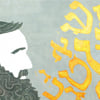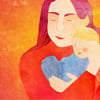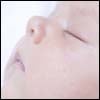
This past Shabbat in synagogue, I watched as a beautiful two-week-old girl was named during the Torah reading. Her name is Chaya Sarah. Chaya means “life,” Sarah is our matriarch. A big name. A powerful name. And a very Jewish name.
Any baby-naming is moving, but this one was especially so.
You see, sitting with the new mother were her mother and her grandmother. Four generations of Jewish women. Yet this was the first Jewish girl in seven generations to receive a Jewish name. The baby’s great-grandmother was a staunch communist, and the daughter of staunch communists. Living behind the Iron Curtain, their Judaism was not just suppressed, it was denied and despised. And yet, today they sat crying while this baby was named Chaya Sarah.
Living behind the Iron Curtain, their Judaism was not just suppressed, it was denied and despisedFollowing the naming we all sang “Siman Tov Umazal Tov,” the traditional song for any joyous occasion. But for the first time I really listened to the words. “Yehei lanu ul’chol Yisrael”—that this should be an auspicious time and good fortune, for all of us and for all of Israel.
Often, when we offer congratulations, they are specific to the one who earned them. We do not include ourselves in the compliment. Yet in Judaism, we do. When there is a milestone, when there is a joyous occasion to celebrate, we are all a part of it. This is why there is no need to invite to a baby-naming ceremony, a brit or a chuppah, as all are invited. On the flip side, there is no need to invite to a funeral or to the mourning home, the shiva. It is our obligation, our responsibility, to attend and be there for the mourner.
Judaism doesn’t allow us to be alone. Not in our time of joy, and not in our time of pain. We are a community. We are one people, with all of our differences. Your celebrations are my celebrations, and your sorrow is my sorrow.
We are about to once again experience the receiving of the Torah, just as we did at Mount Sinai. We do not celebrate what was, but what is. Each year on Shavuot we receive the Torah anew. It is our marriage with our Creator, and just as we are taught that our souls were present when the Torah was first given, so too we are to be present, man, woman and child, when it is given to us again. We are one people, united in our essence, receiving one Torah.
Judaism doesn’t allow us to be alone. Not in our time of joy, and not in our time of painShavuot is my favorite holiday. I mean, who wouldn’t love it? No cleaning, and we eat cheesecake! But there is more. It is the holiday I feel most connected to, because it was a Shavuot experience that sparked my return to a Torah-observant lifestyle (check out my piece Free Trial Period). I love Shavuot because it reminds me that no matter how I may be feeling, I am never alone. I am part of a whole, a very important part of that whole, and I matter.
This morning was monumental not just in the lives of Chaya Sarah’s family members. I do not know this family, but this two-week-old baby gave me such strength and pride. Along with her loved ones, I also teared up when her name was read. And then, as they lifted the Torah for us to gaze at it, I watched Chaya Sarah’s mother bend over and gaze at her baby. Her Torah. Our Torah. Siman tov umazal tov . . . yehei lanu ul’chol Yisrael: may this be an auspicious time and good fortune for us and for all of Israel.






